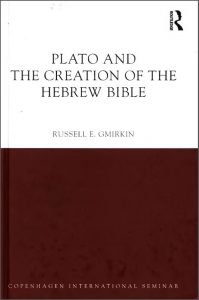Plato’s Laws provides the only example in antiquity of an ethical or national literature comparable to the Hebrew Bible. . . .
. . . . One may therefore reasonably propose that the biblical authors not only found in Plato’s Laws a blueprint for the creation of a persuasive legal code, but a mandate and program for the creation of an authoritative national literature intended to supplement and bolster the laws of the Torah. (Gmirkin, 264)
After having demonstrated the many details, themes and values that the books of the Hebrew Bible share with Greek literature, practices and ideas, Russell Gmirkin concludes with a chapter examining how closely the biblical canon appears to match Plato’s recommendations for a national curriculum. There are certainly Canaanite and Mesopotamian fingerprints in the “Old Testament” but these Scriptures are unlike anything else produced in the ancient Near East. The Hellenistic heritage explains that difference.
The ancient Judean and then Christian authors used to say that Plato got his best ideas from Moses. Gmirkin’s thesis is that the evidence points to the borrowing being in the other direction, that the Judean authors of the Bible found their inspiration in Plato.
I doubt that any Westerner can read Plato’s Laws and not at some point think of a comparison with the Bible. I certainly could not avoid the comparisons: the box insert lists the posts I made prior to reading Plato and the Creation of the Hebrew Bible [PCHB]. So you can see why I have posted so much on PCHB. I think my own interest in Plato’s Laws was sparked by Philippe Wajdenbaum and his book Argonauts of the Desert: Structural Analysis of the Hebrew Bible. I must add a list of posts related to Wajdenbaum’s work, too.
The Bible does not read like a dry or rigid legal code. It is too full of stories for that, and the laws are presented with dramatic flair. That’s Plato, not Hammurabi. Plato believed that laws for a new state should be written in a way that encouraged a loving willingness to obey them. Stories honouring ancient ancestors, legislation presented in persuasive language, pure songs and poetry, all should function to inspire citizens to live with pure and righteous thoughts and behaviour.
Rule by God and God’s Laws
Russell Gmirkin cites Glenn Morrow’s discernment that Plato was in fact setting out a government ruled by “God”, a “divine government”. To quote from Morrow’s article:
Our state is to be called, not a monarchy, nor a democracy, but by some term indicative of that power which is supreme in it, viz., Nous (713a). This Nous is what is truly divine in the cosmos; it is Plato’s God. This divine Nous furnishes the standards for all legislation, and the laws are sovereign only because they have this reason in them. Plato no longer suggests—in fact he explicitly rejects—the conception of personal absolutism. All officials are themselves subject to the law . . . .
(Morrow, 244)
The Bible’s god is not quite Plato’s, though. Plato’s embodiment of Reason was fine for a philosophical discussion among society’s elites. The Bible’s supreme deity does nonetheless meet the fundamental requirements of Plato’s divinity but is more suited for all classes. More on that point later.
Laws had an ancient and divine origin
 Gmirkin rightly emphasizes the importance to Plato that the new laws should not appear to be innovations. On the contrary, myths had to be composed to give the laws an air of great antiquity and divine origin. The peoples’ ancestors, it must be taught, had always kept these laws. PCHB quotes one of several key passages from Laws:
Gmirkin rightly emphasizes the importance to Plato that the new laws should not appear to be innovations. On the contrary, myths had to be composed to give the laws an air of great antiquity and divine origin. The peoples’ ancestors, it must be taught, had always kept these laws. PCHB quotes one of several key passages from Laws:
If there exist laws under which men have been reared up and which (by the blessing of Heaven) have remained unaltered for many centuries, so that there exists no recollection or report of their ever having been different from what they now are, then the whole soul is forbidden by reverence and fear to alter any of the things established of old. By hook or by crook, then, the lawgiver must devise a means whereby this shall be true of his State. (Plato, Laws 7.798a-b)
(Gmirkin, 254)
Plato was imagining a brand new colony being established with a perfect start. The citizens were to be new arrivals into the territory and to be taught that they were the descendants of the original inhabitants divinely commissioned to restore the ancient city or “nation”. The new settlement was to be divided into twelve nominal tribes.
Laws to be presented through a charter myth
A third goal was to create a charter myth for those divine laws in the dramatic narrative form of a foundation story that forged a powerful sense of national identity in those who adopted this literary narrative as their own historical past as descendants of the ancient children of Israel. The refounding of the Jewish nation in the early Hellenistic Era, with new civic and religious institutions and a new constitution and laws, was thus successfully portrayed as a new edition of the ancient writings of Moses, the divine legislator, educator and founder of the ancient Jewish nation, in line with the Platonic legislative agenda.
(Gmirkin, 262)
Continue reading “How Plato Inspired Moses: Creation of the Hebrew Bible”
Like this:
Like Loading...
 The interview with John Curington is available as a single file at Greg Doudna’s academia.edu page.
The interview with John Curington is available as a single file at Greg Doudna’s academia.edu page.
